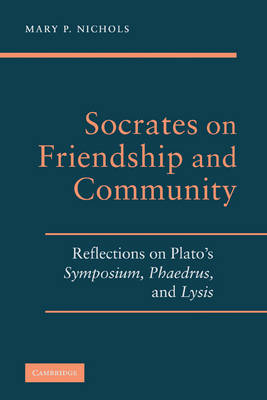
Socrates on Friendship and Community
Cambridge University Press (Verlag)
978-0-521-89973-4 (ISBN)
In Socrates on Friendship and Community, Mary P. Nichols addresses Kierkegaard's and Nietzsche's criticism of Socrates and recovers the place of friendship and community in Socratic philosophizing. This approach stands in contrast to the modern philosophical tradition, in which Plato's Socrates has been viewed as an alienating influence on Western thought and life. Nichols' rich analysis of both dramatic details and philosophic themes in Plato's Symposium, Phaedras, and Lysis shows how love finds its fulfilment in the reciprocal relation of friends. Nichols also shows how friends experience another as their own and themselves as belonging to another. Their experience, she argues, both sheds light on the nature of philosophy and serves as a standard for a political life that does justice to human freedom and community.
Mary P. Nichols is Professor of Political Science and Department Chair at Baylor University. She is the author of numerous books and articles in the history of political thought and politics, literature, and film. Her main areas of research are classical political theory (for example Citizens and Statesmen: A Commentary on Aristotle's 'Politics'), Shakespeare, and film directors such as Woody Allen, John Ford, and Alfred Hitchcock. She is a senior Fellow at The Alexander Hamilton Institute for the Study of Western Civilization in Clinton, New York.
1. The problem of Socrates: Kierkegaard and Nietzsche; 2. Love, generation, and political community (the Symposium); 3. Self-knowledge, love, and rhetoric (Plato's Phaedrus); 4. Who is the friend? (the Lysis); 5. Socratic philosophizing.
| Verlagsort | Cambridge |
|---|---|
| Sprache | englisch |
| Maße | 157 x 234 mm |
| Gewicht | 440 g |
| Themenwelt | Geisteswissenschaften ► Philosophie ► Philosophie Altertum / Antike |
| ISBN-10 | 0-521-89973-7 / 0521899737 |
| ISBN-13 | 978-0-521-89973-4 / 9780521899734 |
| Zustand | Neuware |
| Haben Sie eine Frage zum Produkt? |
aus dem Bereich


